[China in Textbooks]
Guangming Daily reporter Fang Li
On the day when the sweet osmanthus is fragrant, the moon in the world is full. When the autumn wind blows cool and the moon is full, we once again usher in the traditional festival of the Chinese nation - Mid-Autumn Festival. As one of the four major traditional festivals in China, the Mid-Autumn Festival originated in ancient times and has gradually become popular since the Tang and Song dynasties. Its profound cultural charm, colorful festival customs, and rich spiritual connotations have evolved over thousands of years and have become everlasting.
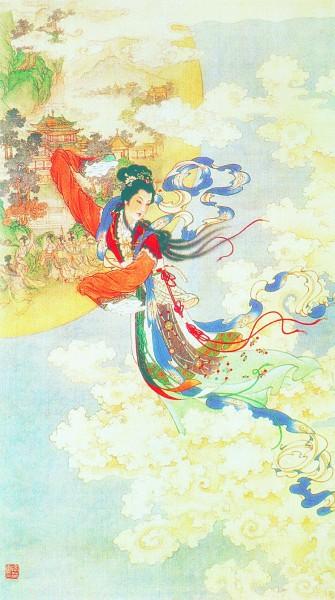
Chang'e Flying to the Moon (Chinese Painting) Ren Shuying
Flipping through the Mid-Autumn Festival poems in the textbook, a picture scroll of Mid-Autumn Moon Night with a clear breeze and bright moon, drinking a cup of tea, admiring the moon and watching the tide comes to life. In this painting, the deep affection of homesickness, the joy of family reunion, and the expectation of pursuing happiness paint the most vivid background color of the Mid-Autumn Festival, condensing into the emotional identity of the Chinese sons and daughters that lasts for thousands of years, and continue to forge ahead for the Chinese nation. And lasting spiritual strength.

Appreciating the Moon in Mid-Autumn Festival (Peasant Painting) Lu Yan, Lu Jinyu
"The bright moon is born on the sea, and the sky is at this moment." (Zhang Jiuling's "Watching the Moon and Huaiyuan", Suzhou Education Edition High School Chinese · Selected Readings of Tang Poems and Song Poems) The clear brilliance of the Mid-Autumn Festival and the bright moon spread all over the beautiful rivers and mountains, pouring into the lingering touch in the hearts of Chinese people. Bright and clean. Amidst the sensual intoxication, the ancients weaved the beautiful legend of Chang'e flying to the moon. "Chang'e took the elixir, and suddenly flew up leisurely. She flew out of the window and flew over the fields covered with silver light, flying higher and higher. There was a bright moon hanging in the blue night sky, and Chang'e was always heading towards the sky. The moon flies away." ("Chang'e Flying to the Moon", Jiangsu Education Edition Fifth Grade Chinese Volume 1) "Chang'e should regret stealing the elixir, and the blue sea and blue sky are heart-warming every night." (Li Shangyin's "Chang'e", Fourth Grade Chinese Volume 1, edited by the Ministry of Education) Poet Imagining the loneliness and coldness of the distant sky, as a contrast to the warmth of reunion in the world.
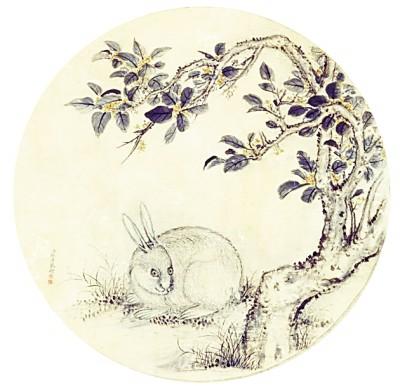
Osmanthus and Rabbit in the Mid-Moon (Chinese Painting Partial) Jiang Pu (Qing Dynasty) Collection of the Palace Museum
On a good day during the festive season, the moon is shining like water. Sitting around the table with your family, toasting to invite the moon, the moon moves, which is very interesting. Appreciating the moon has become a very popular activity during the Mid-Autumn Festival. "The history of appreciating the moon in the Mid-Autumn Festival is very long. According to ancient books, there were activities of worshiping the moon in the Zhou Dynasty of our country, which was a ceremony to pray for a good harvest. Later, the emperor also worshiped the moon on this day to express his wishes. The custom of appreciating the moon It has gradually formed and has been passed down to the present." ("Mid-Autumn Festival", Chinese version of the fifth grade Chinese volume 1)
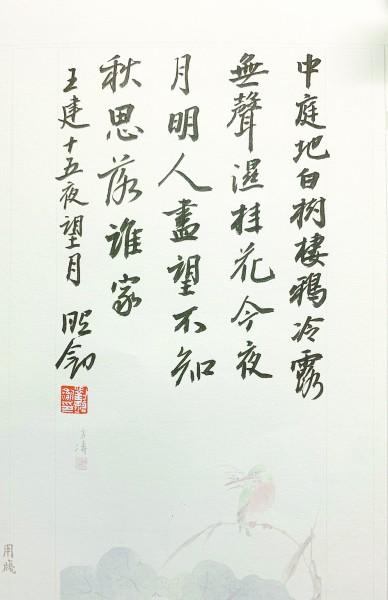
Fifteen Nights Looking at the Moon (calligraphy) Liu Zhaojian
In the Zhejiang area, watching the tide during the Mid-Autumn Festival is another great event. Due to the gravitational force of celestial bodies and the centrifugal effect of the earth's rotation, coupled with the special topography of the bell mouth of Hangzhou Bay, the tidal surge of the Qiantang River around the Mid-Autumn Festival has been a wonder in the world since ancient times. "The white line moved towards us quickly, gradually elongated and thickened, and crossed the river. When we got closer, we saw white waves rolling, forming a wall of water more than two feet high. The waves were getting closer and closer, like Tens of thousands of white war horses marched together, galloping forward mightily; the sound was like a landslide and an earth crack, as if the earth was shaken and trembled."
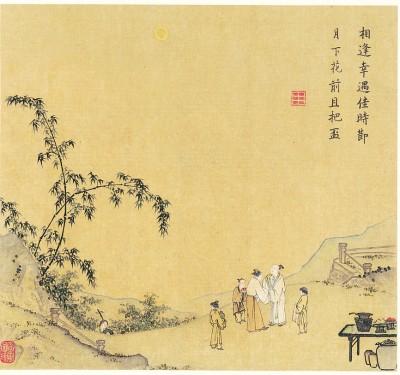
Hand Cup Picture under the Moon (Chinese Painting) Ma Yuan (Biography) (Southern Song Dynasty) Collection of Tianjin Museum
From the ancients offering sacrifices to the moon and praying for blessings, to the literati enjoying the moon and watching the tide, to the people in the market eating moon cakes and enjoying sweet-scented osmanthus, the expectation of reunion and beauty, and the affection of missing relatives and old friends have always been infiltrated. Reunion has become the strongest emotional feature of the Mid-Autumn Festival, and it has been sung repeatedly throughout the ages.
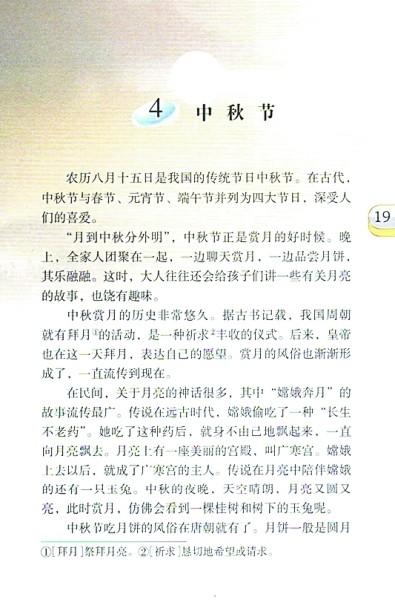
"Mid-Autumn Festival" (inside the textbook) file picture
"The crows live in the white trees in the atrium, and the sweet-scented osmanthus flowers are wet with cold dew. Tonight, the moon is bright and people can look forward to it. I don't know who's house is falling in autumn?" Ming people are far away, think deeply and love long, and the affection of parting and longing for reunion lingers in my heart, and it will last for a long time.
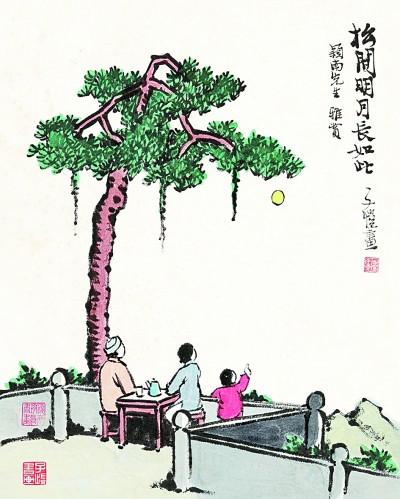
The Bright Moon in the Pine Trees Is So Long (Chinese Painting) Feng Zikai
"When will the bright moon come? Ask the wine to the blue sky. I don't know the palace in the sky, what year it is. I want to go back by the wind, but I'm afraid that Qionglou Yuyu will be too cold on the heights. Dance to find out the shadows, why is it like being in the world. Turn to Zhuge, There is no sleep in a lowly home. There should be no hatred. What is the long-term goodbye? People have sorrows and joys, and the moon has cloudy and sunny waxing and waning. Tiao Ge Tou, the first volume of the ninth grade Chinese, edited by the Department) the poet Su Shi looked at the moon and cared for others, his longing for the bright moon and his longing for his loved ones can be seen at a glance in his unrestrained and unrestrained writing style and flowing language, "I hope people For a long time, thousands of miles together, "become the eternal swan song looking forward to the Mid-Autumn Festival reunion.
"My thoughts are round/the moon in mid-autumn in August/is also the brightest and roundest/no matter how high the mountains are, how wide the sea/the ends of the earth can see it/on such a night/what will I think of?/my thoughts are Round/Watermelons and apples are round/Reunited people are happy/Flesh and blood are divided is painful/Those who miss their loved ones/Looking at the bright moon in the sky/Who can swallow mooncakes?" (Ai Qing's "My Missing" It’s Round”, Jiangsu Education Edition seventh grade Chinese volume 1) Poet Ai Qing used the moon of Mid-Autumn Festival to express his concern for the fate of the motherland and his expectation for the happiness of the people. The hope of reunion reflects the spiritual pursuit of the Chinese people.
These poems, like the bright moon, illuminate the past and the present, showing the beauty of the Mid-Autumn Festival in the shallow singing and low reciting. When the bright moon is in the sky, people either enjoy the long-term moonlight comfortably, or enjoy drinking and chatting happily, or lean on the railing without sleep and send lovesickness from a distance. This is the endless cultural reflection that the Mid-Autumn Festival gives every Chinese son and daughter.
On the occasion of the full moon in the Mid-Autumn Festival, there are also many people with lofty ideals who associate themselves from small homes to everyone. When the mountains and rivers are in turmoil, they express their worries about the future and destiny of the motherland and the nation.
"A round of autumn shadows turns to golden waves, and the flying mirror is polished again. Ask Heng'e about the wine: what can I do if I am deceived by white hair?" Volume 2) On the night of the Mid-Autumn Festival in 1174, Xin Qiji, a poet of the Southern Song Dynasty, expressed his feelings for the moon, strongly expressing his political ideal of opposing compromise and surrender and determined to regain the homeland of the Central Plains.
"Living in Jinghua, it will be the Mid-Autumn Festival soon. The yellow flowers are blooming under the fence, and the autumn appearance is like a wipe. The song on all sides is broken, and the flavor of eight years is only thinking about Zhejiang. It is not worth it to send Nong Qiang as a moth eyebrow!" (Qiu Jin's "Man Jianghong", the second volume of the ninth grade Chinese version of the edited edition) In 1903, during the Mid-Autumn Festival, Qiu Jin lived in the capital. Seeing that her motherland was being bullied by foreign powers and suffering from internal and external troubles, she made up her mind to break out of the family cage, devote herself to the revolution, and devote herself to the cause of national salvation. Write down the lofty ambitions of "the body is not good, the men are ranked, but the heart is stronger than the men" ("Man Jianghong").
It is the continuous struggle of generations of Chinese sons and daughters for the reunification of the family and the country that makes China's mountains and rivers healthy today. At this moment when the moon is full in China, we must cherish the hard-won happiness of the moment, "Take the wind to go, the sky is thousands of miles away, and look straight down at the mountains and rivers" ("Tai Chang Yin · Jiankang Mid-Autumn Night as Uncle Lu's Potential"), in the new On the new journey of the times, we will continue to overcome obstacles and forge ahead bravely.
"Guangming Daily" (Version 10, September 27, 2020)
Articles are uploaded by users and are for non-commercial browsing only. Posted by: Lomu, please indicate the source: https://www.daogebangong.com/en/articles/detail/MidAutumn%20Festival%20in%20textbooks.html

 支付宝扫一扫
支付宝扫一扫 
评论列表(196条)
测试